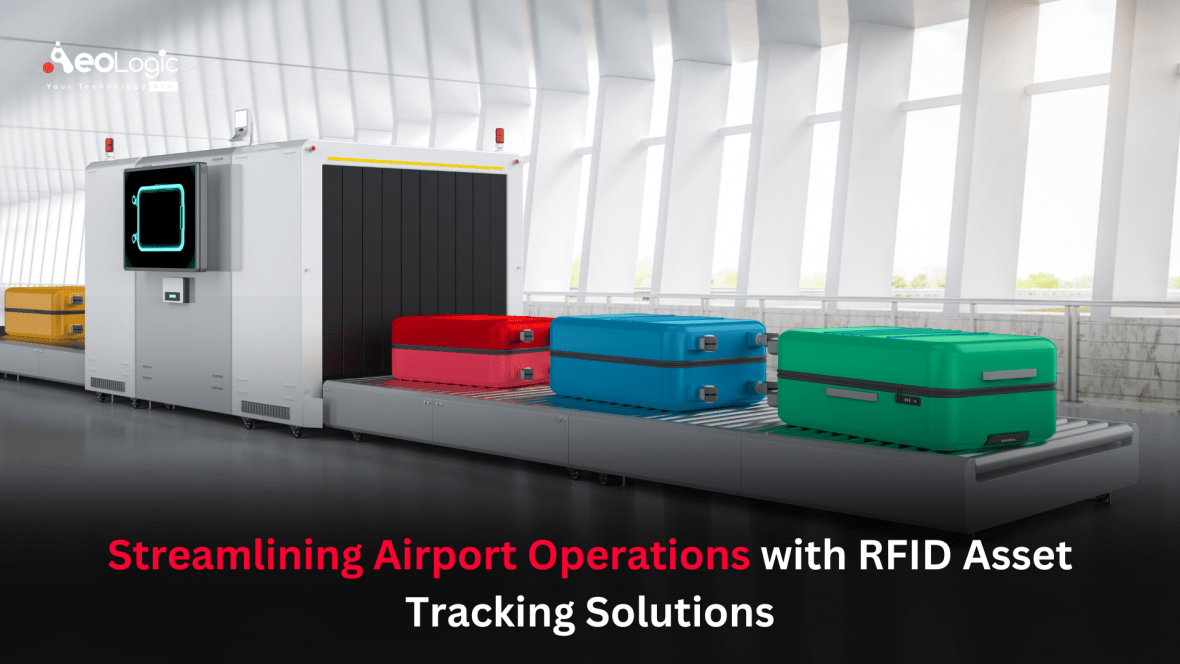The airline industry is a major global industry that contributes to serving the world in various ways. It is a crucial industry, from carrying passengers to carrying goods from one region to another. According to a new research report, the global airline market is analyzed to achieve a value of US$810.1 billion in 2024R. The market has been forecasted to expand at a noteworthy CAGR of 8.8% to reach a valuation ofUS$1723.911 billion by the end of 2034.
There are many operations at airports that should be managed carefully and efficiently to provide a better experience to the customers. However, with the conventional method of managing operations, there can be various problems like asset management, luggage management, theft, loss of assets, bad inventory management, unavailability of tracking systems, data scarcity, etc. These problems should all be cured to make airport operation in a streamlined manner. RFID solutions have been implemented at various airports providing good benefits in terms of asset tracking that efficiently streamlines airport operations.
Short Brief
RFID-powered asset tracking can offer various benefits, such as preventing the theft of luggage, tracking operations, avoiding any inconvenience, improving safety, optimizing resource allocation, automating operations, detecting faults, and monitoring maintenance. These all can enhance the efficiency of airport operations, which directly benefits the airline industry. Generally, RFID works with tags that can attach to objects to provide asset tracking, so tags are the most important element in RFID-based asset tracking.
Many statistics show the importance of RFID for asset tracking can reduce baggage mishandling rates by 25%, which can save airlines around $100 per mishandled bag. RFID can perform routine aircraft checks up to 10 times faster. If we talk about a real-world example, then Delta Airlines implemented RFID tags to track luggage, which has significantly reduced mishandled baggage by 25%.
So we have passed through the introduction part of the topic and got a good idea with some information too. Now we have to move forward to look for some details that will make you clear about the topic. Finally, we will end the discussion with a summary part.
Also Read: Affordable RFID Solutions to Track and Manage Your Assets
What is an Asset Tracking System?
The simplest definition of asset tracking is the process of tracking a company’s physical assets, either by employing tags that broadcast the “WHERE” in fleet operations or by scanning barcode labels that are attached to the assets.
An asset-tracking system gives you precise, up-to-date information on the whereabouts and movements of valuable automobiles, freight, and mobile employees like your fleet drivers.
RFID tracking offers advantages like the following and seeks to eliminate error-prone techniques like pen and paper and Excel spreadsheets:
- Keeping track of several assets simultaneously
- Getting rid of human involvement
- Real-time data collection
- Increasing the visibility of assets
- Finding missing or lost property
- Increasing inventory accuracy
Globally, asset-tracking solution use has reached its highest point in the past 20 years. According to estimates, the worldwide asset tracking market share will reach $36.3 billion by 2025, with the manufacturing, logistics, retail, and healthcare industries driving the industry.
Also Read: Implementation of RFID in Baggage Operations at Airports
RFID-Powered Asset Tracking in Airport Operations
RFID asset tracking system is defined as RFID tags and electromagnetic readers used to keep track of valuable assets, like physical assets that are stationary or mobile. The assets have an RFID tag attached to them that includes details about their name, location, quantity, and condition. For the airport industry, RFID tags or labels generally apply to assets, as these labels include data that enables a unique identification of the traveler, the suitcase’s origin, and its destination. This overall provides enhanced asset tracking in airports to streamline the operation in an efficient manner.
Top Benefits of RFID Asset Tracking solutions for Airport Operations
It’s time to see some pros of RFID asset tracking in streamlining airport operations. Here are a few benefits mentioned below that signify the importance of RFID.
1. Better asset visibility
Asset visibility can play an important role, and if there is a facility for real-time asset visibility, then what can be better than this? With the RFID asset tracking solutions, the visibility of various assets like equipment, luggage, machines, carts, trolleys, etc. can be enhanced in real-time. This helps to track the assets effectively that do not cause any loss.
2. Fasten operation efficiency
The airline industry is a fast-moving industry that needs to maintain the pace of operational efficiency. Without any particular tracking tools, this is not possible to boost operational efficiency. Where with RFID asset tracking can faster operational efficiency, as this allows getting the right equipment or asset availability exactly on time and also makes easy access to assets quickly in emergencies.
3. Better inventory management
Inventory is always an important aspect for any industry, and it matters too much for airports too. As mentioned earlier, the airline industry is a fast-moving industry that needs assets quickly to avoid any inconvenience. With RFID-powered asset tracking, it is possible to manage inventory efficiently as it enables the exact data about stock remaining, amount of assets, expiring dates, etc.
Also Read: Uses of RFID System in Airport Baggage Handling
4. Reduce customer complaints
Customers are generally the most important factors in transportation. Sometimes bag mishandling can result in complaints from customers and unpleasant experiences too. With RFID power asset tracking, luggage and bags can be tracked throughout the whole journey to avoid losing any assets. This enhances the customer experience and reduces customer complaints.
5. Automated workflow
Automation is everywhere, as this saves a lot of human labor and cost and also improves the operation accuracy compared to manual. RFID integration with other technologies like artificial intelligence can automate various operations like the check-in/check-out process and detection of any unauthorized assets. This improves the accuracy and also streamlines the operations.
Challenges with RFID Asset Tracking Solutions for Airport Operations
We have passed through the pros of RFID asset tracking for airport operations. Now it’s time to see some cons, as there are a few mentioned below.
- Regulatory compliance could be an issue, as it is not necessary that each RFID device follows the standard and regulations of aviation.
- Limited storage of data is another challenging factor, as airports produce vast amounts of data regularly that cannot be stored wholly with RFID asset tracking systems.
- Any small wear and tear on tags can affect their performance, so the reliability and durability of tags are also doubtful.
Also Read: How Airlines Track Bags and Avoid Losing Baggage with RFID
Final Words
RFID technology has benefited the airport’s operations in an efficient manner that results can be seen in various regions. We have seen various benefits earlier; you can recall them if needed. RFID-powered asset tracking can enhance many aspects like luggage tracking, security, inventory management, real-time visibility, automation, etc. While there are few challenges that can interrupt the implementation, such as cost, lack of regulatory compliance, limited storage, durability of tags, etc. Overall, RFID asset tracking for airport operations can boost the whole airline industry in a positive manner.







